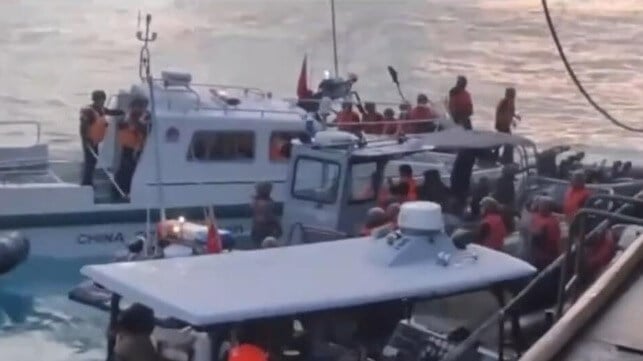After Clash in S. China Sea, Manila Plans to "Do More" Than Protest
But the Marcos administration emphasizes that the Philippines will not "instigate wars"

After the China Coast Guard's aggressive interdiction at Second Thomas Shoal on June 17, which injured multiple Philippine servicemembers, Philippine President Ferdinand Marcos Jr. is trying to carefully push back against China's "illegal" and "deliberate" intimidation campaign in the Spratly Islands - without starting a broader conflict. While the Philippines has no plans to "instigate wars," he said, Manila plans to "do more" than file another diplomatic protest with China's ambassador this time.
On June 17, China Coast Guard servicemembers in eight motorboats set upon two Philippine Navy RHIBs as they lay alongside the hull of the BRP Sierra Madre, the grounded ship that serves as an outpost at Second Thomas Shoal. The CCG personnel were armed with axes, knives and spears, and they threatened the Philippine servicemembers and repeatedly rammed their boats at high speed. Eight of the Philippine servicemembers were injured, including one who lost his thumb when his boat was rammed by a Chinese vessel (below).
WATCH: Extraordinary slow motion video:
— Indo-Pacific News - Geo-Politics & Defense (@IndoPac_Info) June 25, 2024
The moment a #China Coast Guard vessel rams a Philippine Navy boat injuring a soldier in Ayungin Shoal on June 17.
The soldier lost a finger when the PLA boat hit the PH vessel. He almost didn't make it.
Via @Joseph_Morong pic.twitter.com/cBEbSMd2nF
Marcos' advisors have given differing interpretations of the day's events. The Armed Forces of the Philippines called China's behavior "coercive, aggressive and barbaric," but Executive Secretary Lucas Bersamin initially said that the run-in was "probably a misunderstanding, or an accident." Bersamin's characterization came in for swift criticism, given the China Coast Guard's long track record of harassing convoys at the BRP Sierra Madre, and Marcos walked back that statement after he visited with the troops who had been at the scene.
Though the CCG personnel brandished bladed weapons, boarded and towed off Philippine vessels, injured servicemembers, and damaged or jettisoned supplies, Marcos and defense minister Gilbert Teodoro have emphasized that the encounter was not an "armed attack" - an event which could trigger the Philippines' mutual defense treaty with the United States.
“It’s not an armed attack. [No shot was fired. They didn’t point a gun at us.] But it was a deliberate action to stop our people," Marcos clarified Thursday. "Although there were no arms involved, nonetheless, it is still a deliberate action, and essentially an illegal action taken by Chinese forces."
Marcos told reporters that it would not be enough to summon the Chinese ambassador, which has been done many times before without producing a result. "We have to do more than that," he told Rappler.
He did not clarify what that response would look like, but it appears clear that the Philippines will be conducting a new supply mission to Second Thomas Shoal soon - perhaps as early as this week, according to the Washington Post.

that matters most
Get the latest maritime news delivered to your inbox daily.
The U.S. has condemned the China Coast Guard's actions at Second Thomas Shoal, and as a major treaty ally it has pledged to support Manila. However, U.S. officials told the Post that they have not agreed on a response to the events of June 17, and are still considering it. "Do we want to commit to something that could spiral out of control?" one official said. "That's very much a factor at play."
U.S. and Philippine forces will carry out a joint exercise in the region soon, the officials confirmed. The AFP will also be repeating its regular supply mission to Second Thomas Shoal again shortly, possibly as early as this week.
